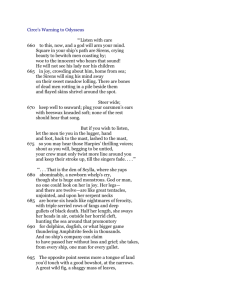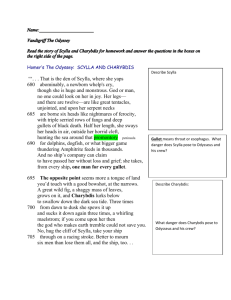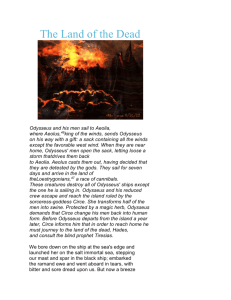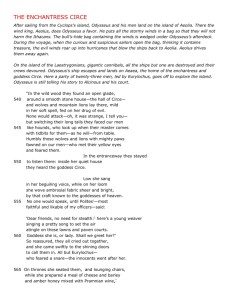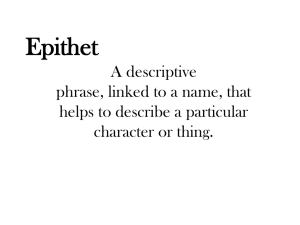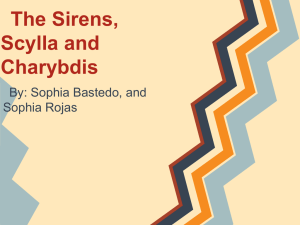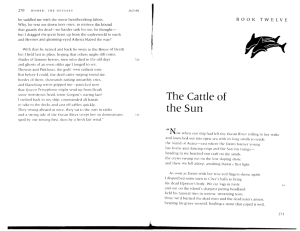File
advertisement
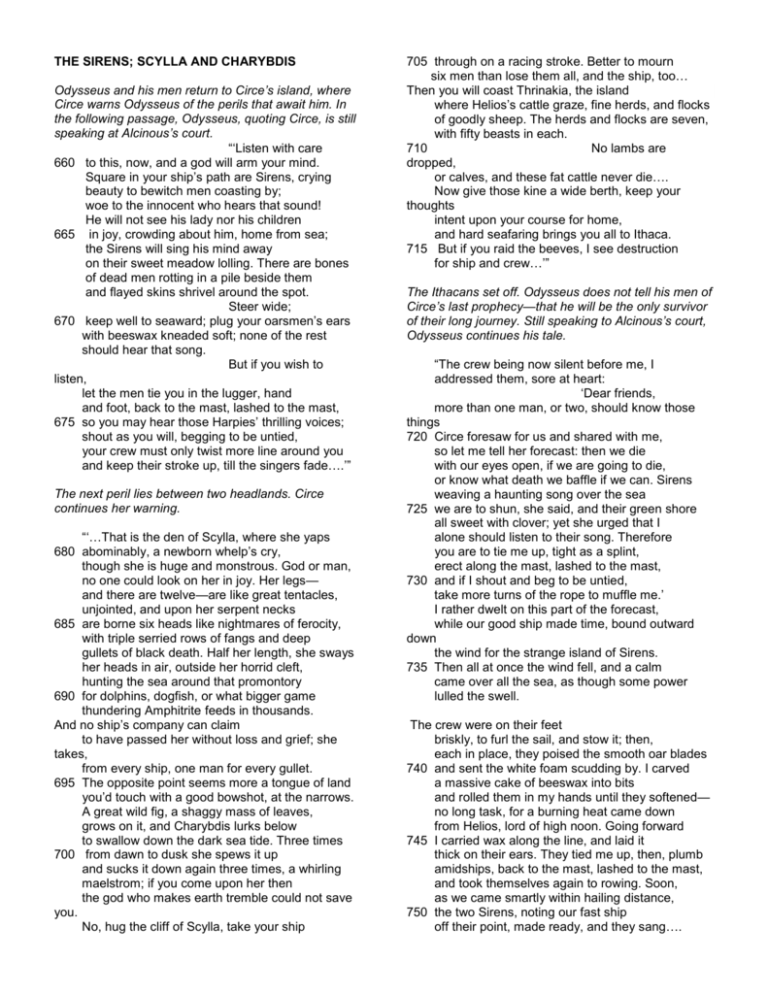
THE SIRENS; SCYLLA AND CHARYBDIS Odysseus and his men return to Circe’s island, where Circe warns Odysseus of the perils that await him. In the following passage, Odysseus, quoting Circe, is still speaking at Alcinous’s court. “‘Listen with care 660 to this, now, and a god will arm your mind. Square in your ship’s path are Sirens, crying beauty to bewitch men coasting by; woe to the innocent who hears that sound! He will not see his lady nor his children 665 in joy, crowding about him, home from sea; the Sirens will sing his mind away on their sweet meadow lolling. There are bones of dead men rotting in a pile beside them and flayed skins shrivel around the spot. Steer wide; 670 keep well to seaward; plug your oarsmen’s ears with beeswax kneaded soft; none of the rest should hear that song. But if you wish to listen, let the men tie you in the lugger, hand and foot, back to the mast, lashed to the mast, 675 so you may hear those Harpies’ thrilling voices; shout as you will, begging to be untied, your crew must only twist more line around you and keep their stroke up, till the singers fade….’” The next peril lies between two headlands. Circe continues her warning. “‘…That is the den of Scylla, where she yaps 680 abominably, a newborn whelp’s cry, though she is huge and monstrous. God or man, no one could look on her in joy. Her legs— and there are twelve—are like great tentacles, unjointed, and upon her serpent necks 685 are borne six heads like nightmares of ferocity, with triple serried rows of fangs and deep gullets of black death. Half her length, she sways her heads in air, outside her horrid cleft, hunting the sea around that promontory 690 for dolphins, dogfish, or what bigger game thundering Amphitrite feeds in thousands. And no ship’s company can claim to have passed her without loss and grief; she takes, from every ship, one man for every gullet. 695 The opposite point seems more a tongue of land you’d touch with a good bowshot, at the narrows. A great wild fig, a shaggy mass of leaves, grows on it, and Charybdis lurks below to swallow down the dark sea tide. Three times 700 from dawn to dusk she spews it up and sucks it down again three times, a whirling maelstrom; if you come upon her then the god who makes earth tremble could not save you. No, hug the cliff of Scylla, take your ship 705 through on a racing stroke. Better to mourn six men than lose them all, and the ship, too… Then you will coast Thrinakia, the island where Helios’s cattle graze, fine herds, and flocks of goodly sheep. The herds and flocks are seven, with fifty beasts in each. 710 No lambs are dropped, or calves, and these fat cattle never die…. Now give those kine a wide berth, keep your thoughts intent upon your course for home, and hard seafaring brings you all to Ithaca. 715 But if you raid the beeves, I see destruction for ship and crew…’” The Ithacans set off. Odysseus does not tell his men of Circe’s last prophecy—that he will be the only survivor of their long journey. Still speaking to Alcinous’s court, Odysseus continues his tale. “The crew being now silent before me, I addressed them, sore at heart: ‘Dear friends, more than one man, or two, should know those things 720 Circe foresaw for us and shared with me, so let me tell her forecast: then we die with our eyes open, if we are going to die, or know what death we baffle if we can. Sirens weaving a haunting song over the sea 725 we are to shun, she said, and their green shore all sweet with clover; yet she urged that I alone should listen to their song. Therefore you are to tie me up, tight as a splint, erect along the mast, lashed to the mast, 730 and if I shout and beg to be untied, take more turns of the rope to muffle me.’ I rather dwelt on this part of the forecast, while our good ship made time, bound outward down the wind for the strange island of Sirens. 735 Then all at once the wind fell, and a calm came over all the sea, as though some power lulled the swell. The crew were on their feet briskly, to furl the sail, and stow it; then, each in place, they poised the smooth oar blades 740 and sent the white foam scudding by. I carved a massive cake of beeswax into bits and rolled them in my hands until they softened— no long task, for a burning heat came down from Helios, lord of high noon. Going forward 745 I carried wax along the line, and laid it thick on their ears. They tied me up, then, plumb amidships, back to the mast, lashed to the mast, and took themselves again to rowing. Soon, as we came smartly within hailing distance, 750 the two Sirens, noting our fast ship off their point, made ready, and they sang…. The lovely voices in ardor appealing over the water made me crave to listen, and I tried to say ‘Untie me!’ to the crew, jerking my brows; 755 but they bent steady to the oars. Then Perimedes got to his feet, he and Eurylochus, and passed more line about, to hold me still. So all rowed on, until the Sirens dropped under the sea rim, and their singing dwindled away. 760 My faithful company rested on their oars now, peeling off the wax that I had laid thick on their ears; then set me free. But scarcely had that island faded in blue air when I saw smoke 765 and white water, with sound of waves in tumult— a sound the men heard, and it terrified them. Oars flew from their hands; the blades went knocking wild alongside till the ship lost way, with no oar blades to drive her through the water. 770 Well, I walked up and down from bow to stern, trying to put heart into them, standing over every oarsman, saying gently, Friends, have we never been in danger before this? More fearsome, is it now, than when the Cyclops 775 penned us in his cave? What power he had! Did I not keep my nerve, and use my wits to find a way out for us? Now I say by hook or crook this peril too shall be something that we remember. Heads up, lads! 780 We must obey the orders as I give them. Get the oar shafts in your hands, and lie back hard on your benches; hit these breaking seas. Zeus help us pull away before we founder. You at the tiller, listen, and take in 785 all that I say—the rudders are your duty; keep her out of the combers and the smoke; steer for that headland; watch the drift, or we fetch up in the smother, and you drown us.’ That was all, and it brought them round to action. 790 But as I sent them on toward Scylla, I told them nothing, as they could do nothing. They would have dropped their oars again, in panic, to roll for cover under the decking. Circe’s bidding against arms had slipped my mind, 795 so I tied on my cuirass and took up two heavy spears, then made my way along to the foredeck—thinking to see her first from there, the monster of the gray rock, harboring torment for my friends. I strained my eyes 800 upon that cliffside veiled in cloud, but nowhere could I catch sight of her. And all this time, in travail, sobbing, gaining on the current, we rowed into the strait—Scylla to port and on our starboard beam Charybdis, dire 805 gorge of the salt sea tide. By heaven! when she vomited, all the sea was like a caldron seething over intense fire, when the mixture suddenly heaves and rises. The shot spume soared to the landside heights, and fell like rain. 810 But when she swallowed the sea water down we saw the funnel of the maelstrom, heard the rock bellowing all around, and dark sand raged on the bottom far below. My men all blanched against the gloom, our eyes 815 were fixed upon that yawning mouth in fear of being devoured. Then Scylla made her strike, whisking six of my best men from the ship. I happened to glance aft at ship and oarsmen and caught sight of their arms and legs, dangling 820 high overhead. Voices came down to me in anguish, calling my name for the last time. A man surf-casting on a point of rock for bass or mackerel, whipping his long rod to drop the sinker and the bait far out, 825 will hook a fish and rip it from the surface to dangle wriggling through the air; so these were borne aloft in spasms toward the cliff. She ate them as they shrieked there, in her den, in the dire grapple reaching still for me— 830 and deathly pity ran me through at that sight—far the worst I ever suffered questing the passes of the strange sea. We rowed on. The Rocks were now behind; Charybdis, too, and Scylla dropped astern. Then we were coasting 835 the noble island of the god, where grazed those cattle with wide brows, and bounteous flocks of Helios, lord of noon, who rides high heaven. From the black ship, far still at sea, I heard the lowing of the cattle winding home 840 and sheep bleating; and heard, too, in my heart the words of blind Teiresias of Thebes and Circe of Aeaea: both forbade me the island of the world’s delight, the Sun….” THE CATTLE OF THE SUN GOD Odysseus urges his exhausted crew to bypass Thrinakia, the island of the sun god, Helios. When the men insist on landing, Odysseus makes them swear not to touch the god’s cattle. Odysseus is still speaking to Alcinous’s court. “In the small hours of the third watch, when stars 845 that shone out in the first dusk of evening had gone down to their setting, a giant wind blew from heaven, and clouds driven by Zeus shrouded land and sea in a night of storm; so, just as Dawn with fingertips of rose 850 touched the windy world, we dragged our ship to cover in a grotto, a sea cave where nymphs had chairs of rock and sanded floors. I mustered all the crew and said: ‘Old shipmates, our stores are in the ship’s hold, food and drink; 855 the cattle here are not for our provision, or we pay dearly for it. 860 865 870 875 880 say. Fierce the god is who cherishes these heifers and these sheep: Helios; and no man avoids his eye.’ To this my fighters nodded. Yes. But now we had a month of onshore gales, blowing day in, day out—south winds, or south by east. As long as bread and good red wine remained to keep the men up, and appease their craving, they would not touch the cattle. But in the end, when all the barley in the ship was gone, hunger drove them to scour the wild shore with angling hooks, for fishes and sea fowl, whatever fell into their hands; and lean days wore their bellies thin. The storms continued. So one day I withdrew to the interior to pray the gods in solitude, for hope that one might show me some way of salvation. Slipping away, I struck across the island to a sheltered spot, out of the driving gale. I washed my hands there, and made supplication to the gods who own Olympus, all the gods— but they, for answer, only closed my eyes under slow drops of sleep. Now on the shore Eurylochus made his insidious plea: ‘Comrades,’ he said, ‘You’ve gone through everything; listen to what I All deaths are hateful to us, mortal wretches, but famine is the most pitiful, the worst end that a man can come to. Will you fight it? Come, we’ll cut out the noblest of these cattle 885 for sacrifice to the gods who own the sky; and once at home, in the old country of Ithaca, if ever that day comes— we’ll build a costly temple and adorn it with every beauty for the Lord of Noon. 890 But if he flares up over his heifers lost, wishing our ship destroyed, and if the gods make cause with him, why, then I say: Better open your lungs to a big sea once for all than waste to skin and bones on a lonely island!’ 895 Thus Eurylochus; and they murmured ‘Aye!’ trooping away at once to round up heifers. Now, that day tranquil cattle with broad brows were grazing near, and soon the men drew up around their chosen beasts in ceremony. 900 They plucked the leaves that shone on a tall oak— having no barley meal—to strew the victims, performed the prayers and ritual, knifed the kine and flayed each carcass, cutting thighbones free to wrap in double folds of fat. These offerings, 905 with strips of meat, were laid upon the fire. Then, as they had no wine, they made libation with clear spring water, broiling the entrails first; and when the bones were burnt and tripes shared, they spitted the carved meat. Just then my slumber 910 left me in a rush, my eyes opened, and I went down the seaward path. No sooner had I caught sight of our black hull, than savory odors of burnt fat eddied around me; grief took hold of me, and I cried aloud: 915 ‘O Father Zeus and gods in bliss forever, you made me sleep away this day of mischief! O cruel drowsing, in the evil hour! Here they sat, and a great work they contrived.’ Lampetia in her long gown meanwhile 920 had borne swift word to the Overlord of Noon: ‘They have killed your kine.’ And the Lord Helios burst into angry speech amid the immortals: ‘O Father Zeus and gods in bliss forever, punish Odysseus’ men! So overweening, 925 now they have killed my peaceful kine, my joy at morning when I climbed the sky of stars, and evening, when I bore westward from heaven. restitution or penalty they shall pay— and pay in full—or I go down forever 930 to light the dead men in the underworld.’…” (from Book 12) When Odysseus and his men set sail again, they are punished with death—a thunderbolt from Zeus destroys their boat, and all the men drown. Only Odysseus survives. Exhausted and nearly drowned, he makes his way to Calypso’s island, where we met him originally, in Book 5. Odysseus has brought us up to date. He can now rest and enjoy the comforts of Alcinous’s court—but not for long. Ahead lies his most difficult task—reclaiming his own kingdom. At this moment of suspense, Homer might have put aside his harp until the next night.
